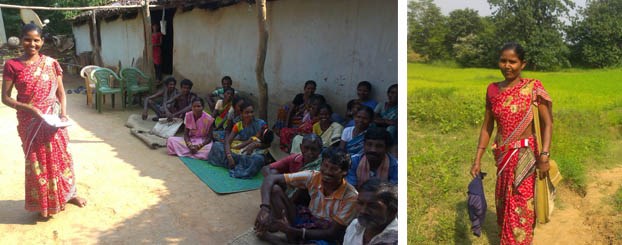
Anna Kujur, 47, is a popular figure among the tribals of Sundergarh district in Odisha. She not only encourages them to stand up for their rights and entitlements but also gives them a reason to hope for a better tomorrow. Clad in a plain sari and ordinary rubber slippers with a cloth bag slung over her shoulder, this simple tribal woman from Sunajor village has spent nearly a decade spreading awareness among the forest-dwelling communities in the region about their legitimate claims on forest resources. It’s routine for Anna-di, as she is known in these parts, to traverse around 25 km on her cycle everyday, talking to people about land rights and facilitating them in securing their own ‘patta’ for cultivation.

In Sundergarh, the scheduled tribes make up 50 per cent of the total population of the district. For sustenance and survival, these poor, largely illiterate folk either turn to the forest or resort to some minor agricultural activity. Since the verdant greens have always provided them with forest produce, water, grazing grounds and habitat for shifting cultivation for generations, they have not only been staying in and around forest lands but have also guarded and conserved them with a lot of love and care. However, this integral and close-knit relationship between the tribals and the forest has rarely been recognised by the authorities.
Under the laws that govern forests in India — the Indian Forest Act, 1927 and the WildLife (Protection) Act, 1972 — the rights of people living in or depending on the area declared as a forest are to be ‘settled’ by a forest settlement officer. This makes them vulnerable to exploitation as well as eviction. Although the Forest Rights Act (FRA) of 2006 does restore the rights of the forest-dwelling communities — and provisions for making conservation more effective and transparent — the reality on the ground has not changed much.
Anna is no stranger to tough times. As a child, she witnessed her landless parents work day-and-night to make ends meet. After marriage, her problems only multiplied. Nursing a burning desire to change her own fate, and that of others like her, she had always wanted to make a difference. “Even as a child I had wanted to serve my people and fight the injustice I saw around me. In 2000, I set up the Athkosia Adivasi Sangathan and have been agitating for the members’ rights under this banner. In 2003, I connected with the Campaign for Survival and Dignity (CSD), a national platform of tribal and forest dwellers’ organisations, and participated in a three-day training workshop on the rights of forest dwellers. This gave my own activism a sharper focus.
Then when the Forest Rights Act 2006 came in place, it became slightly easy to achieve my goal. Being at the helm of organising awareness programmes among forest dwellers of around 148 villages, I mobilised them to join forces and demand their land rights.”
Though it was a challenging task to pursue files in various offices for the land patta, with the help of CSD activists, she was able to move forward. “Today, it gives me immense pleasure when I see the people who got their land patta and are cultivating their land,” she adds.
So far, Anna has helped about 2,000 tribal people obtain their rightful patta. Sugal Ekka, 44, from Gothbandha village, is one of them. Says this mother of three, “We are small farmers who are dependent on the forest. Unless we cultivate land, we have nothing to eat. Earlier our landlords, who are generally non-tribal, threatened us and even destroyed our crops. However, with the support and guidance of Anna-di, we applied for the patta and got it in 2008.
After obtaining the right over our land our life took a turn for the better. Nowadays, we grow vegetables and seasonal crop.” Malti Balka, 40, from Buda Jharana, also acknowledges Anna’s contribution in making her life better. She says that till they got their patta in 2008, they worked as daily wage labourers. Since work was not always available here, “it was extremely difficult to feed our children. We used to go into the nearby forest to collect minor forest produce but time and again we were threatened by the forest officials. It’s a shame that even though our families have been residing here since generations, we are still branded as encroachers. Under Anna’s leadership, we learnt to raise our voice for our rights over the land. After years of struggle, we have succeeded. Everything has been possible only because of Anna-di, who has braved all odds for our sake.”
But in her quest to help others, Anna got no support from her family; her husband. Nicholas felt she was neglecting her household duties to do “social service,” which didn’t bring any money home. Often, to dissuade her, he would beat her up. But Anna encouraged him to attend a public meeting. Here, not only was Anna praised and thanked, many people thanked Nicholas too. This changed his attitude and today he also works for this cause. “I now realise that what she does requires a lot of patience and guts that most women do not possess. She is the strength of my family,” he now says. Anna has also courageously exposed the corruption of forest personnel and is instrumental in the suspension of a Ranger for taking bribes. Today, thousands of tribal forest dwellers in Sundergarh live without fear and produce different kinds of seasonal crops, thanks to Anna’s relentless work.





